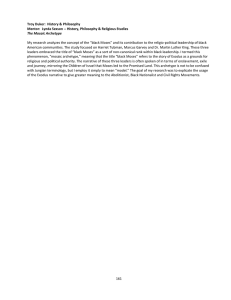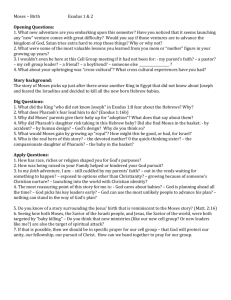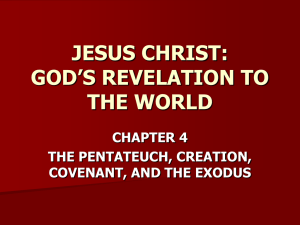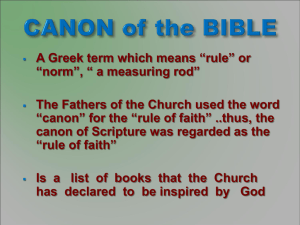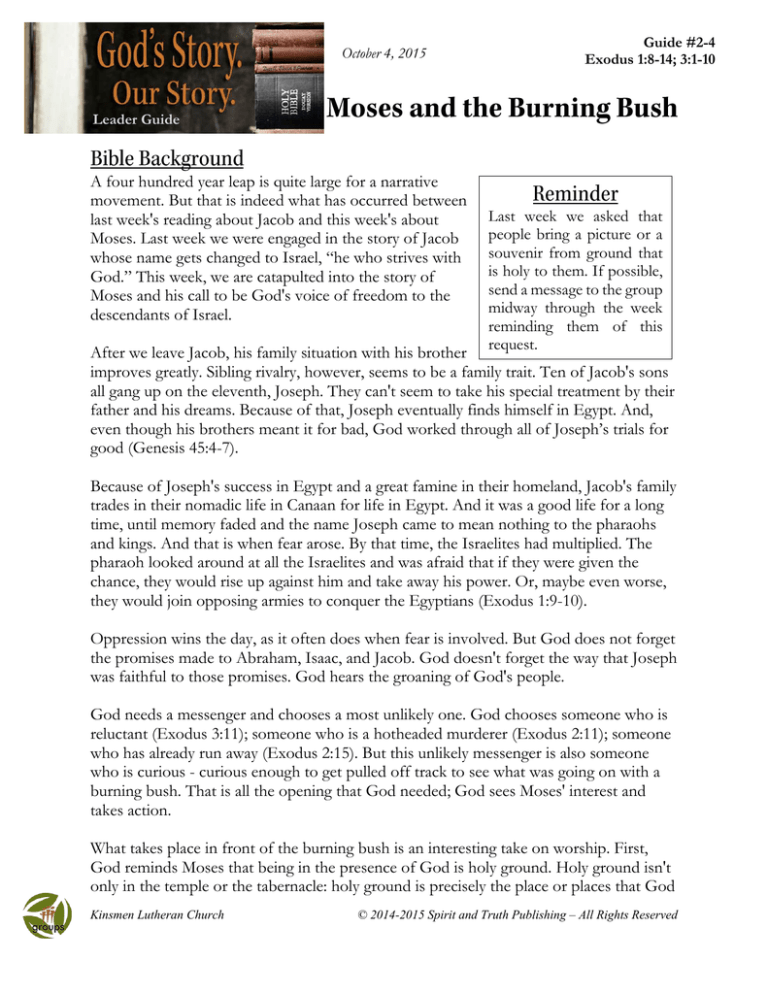
October 4, 2015
Guide #2-4
Exodus 1:8-14; 3:1-10
Leader Guide
A four hundred year leap is quite large for a narrative
movement. But that is indeed what has occurred between
last week's reading about Jacob and this week's about
Moses. Last week we were engaged in the story of Jacob
whose name gets changed to Israel, “he who strives with
God.” This week, we are catapulted into the story of
Moses and his call to be God's voice of freedom to the
descendants of Israel.
Last week we asked that
people bring a picture or a
souvenir from ground that
is holy to them. If possible,
send a message to the group
midway through the week
reminding them of this
request.
After we leave Jacob, his family situation with his brother
improves greatly. Sibling rivalry, however, seems to be a family trait. Ten of Jacob's sons
all gang up on the eleventh, Joseph. They can't seem to take his special treatment by their
father and his dreams. Because of that, Joseph eventually finds himself in Egypt. And,
even though his brothers meant it for bad, God worked through all of Joseph’s trials for
good (Genesis 45:4-7).
Because of Joseph's success in Egypt and a great famine in their homeland, Jacob's family
trades in their nomadic life in Canaan for life in Egypt. And it was a good life for a long
time, until memory faded and the name Joseph came to mean nothing to the pharaohs
and kings. And that is when fear arose. By that time, the Israelites had multiplied. The
pharaoh looked around at all the Israelites and was afraid that if they were given the
chance, they would rise up against him and take away his power. Or, maybe even worse,
they would join opposing armies to conquer the Egyptians (Exodus 1:9-10).
Oppression wins the day, as it often does when fear is involved. But God does not forget
the promises made to Abraham, Isaac, and Jacob. God doesn't forget the way that Joseph
was faithful to those promises. God hears the groaning of God's people.
God needs a messenger and chooses a most unlikely one. God chooses someone who is
reluctant (Exodus 3:11); someone who is a hotheaded murderer (Exodus 2:11); someone
who has already run away (Exodus 2:15). But this unlikely messenger is also someone
who is curious - curious enough to get pulled off track to see what was going on with a
burning bush. That is all the opening that God needed; God sees Moses' interest and
takes action.
What takes place in front of the burning bush is an interesting take on worship. First,
God reminds Moses that being in the presence of God is holy ground. Holy ground isn't
only in the temple or the tabernacle: holy ground is precisely the place or places that God
Kinsmen Lutheran Church
© 2014-2015 Spirit and Truth Publishing – All Rights Reserved
shows up. So, far from being a singular place
that God lives, God is on the move in the
world. God shows up in places other than the
ones we expect. Holy ground can be all
around us because it is nothing short of a
place that God is known. God asks Moses to
recognize it by taking his sandals off; then
God reminds Moses of the promises made in
the past. God proclaims a word to Moses
about who it is that is speaking from the bush:
the God of Abraham, the God of Isaac, and
the God of Jacob. God is linked to the past,
and by doing so, links Moses in with that line
of promise. It is then Moses' turn to respond
to the holy ground and promising Presence:
Moses turns his face. In an act of sheer awe,
he turns his face. Finally, God sends Moses
out with a specific call: to go and save God's
people.
Holy ground (wherever it may be), a reminder
of who God is, a response from us, and a call
to go to proclaim that same promising
presence that we have received. This is the
essence of worship.
To fill in some of the narrative gaps, it
might be nostalgic fun for you (and maybe
even your group) to watch some of these
YouTube clips from some of the great
cinematic depictions of the Exodus story
such as:
Cecil B. DeMille's The Ten Commandments
Baby Moses (2:03):
https://www.youtube.com/watch?v
=92ygYJw9CSE
Picture of Slavery (2:21):
https://www.youtube.com/watch?v=4e
VIJME3JW8
Moses and the Burning Bush (6:33):
https://www.youtube.com/watch?v=U
0Mg-eZqEdI
DreamWorks Prince of Egypt
Various clips available at:
https://www.youtube.com/watch?v
=E8pEXd4s1yU
For a newer adaptation of the story,
? Has curiosity ever pulled you off track?
Exodus: Gods and Kings by Ridley Scott is
Did it lead to something good?
available for viewing as well.
? Has God ever asked you to do something
you didn't think you could do?
? Can you take the form of your congregation's worship and find its parallels in the
worship points of the text?
Psalm 78, 102
Jeremiah 34: 12-32
Mark 14:12-26
Romans 6
Kinsmen Lutheran Church
© 2014-2015 Spirit and Truth Publishing – All Rights Reserved
October 4, 2015
Guide #2-4
Exodus 1:8-14; 3:1-10
Participant Guide
Share your picture or souvenir of your “holy ground” and share what makes it holy to
you. If you don't have a picture or an item, simply describe what “holy ground” is to
you.
We have made a tremendous leap in Israel's history from last
week to this – over 400 years! In that time, the people of
Israel have gone from being a nomadic group to a people who
have settled in the land of Egypt. But now things are not
going so well for them….
Read Exodus 1:8-10
? Right away we are called upon to remember
who Joseph is and why he is supposed to
mean something to the Pharaoh. Recall all
you can about the Joseph story and Egypt
and Pharaoh. Now that 400 years have
passed, what seems to be the trouble
(according to Pharaoh)?
Read Exodus 1:11-14
? What stands out to you about the oppression
of the Hebrew people? Before going to the
next part of the story, tell all you can
remember from the birth and early life of
Moses. What else do you know about Moses?
Read Exodus 3:1-4
? Moses is not real keen about being God's
mouthpiece of hope (see 3:11). And, it seems
as though Moses got himself into this calling
because of his curiosity. When has your
curiosity moved you into territories that you
weren't sure about?
Kinsmen Lutheran Church
The Exodus story has always been
the defining moment of freedom
in the scriptures. It is that moment
when God reached out to the
outcast and despised and brought
them into a land of milk and
honey. This interplay between
slavery and freedom returns again
and again throughout the
Scriptures.
The psalmists remind worshipers
that God is faithful to Israel
precisely because of the Exodus
story. The prophets call the
wayward people of Israel to
remember the goodness of God
shown to them in the Exodus.
And, as Jesus arrives on the scene,
even he recalls the great Passover
Meal as he celebrates his Last
Supper with his disciples. Jesus'
very life was a recounting of the
story of the Exodus, as he himself
reached out to the outcast and
despised and ultimately, on the
cross, liberated all people from
slavery to sin and freedom to live
anew.
© 2014-2015 Spirit and Truth Publishing – All Rights Reserved
Read Exodus 3:5-8
? There are four actions in this section that can correlate with worship: 1)
entrance into holy ground; 2) reminder of who God is; 3) response to who
God is; and 4) a specific call to the world. Can you find these four items in the
text? Are you able to find correlates in your own congregational worship?
Worship is about our response to the loving, gracious presence of God.
How do you, in your worship life as a congregation, hear about or
experience the gracious presence of God? Does it ever happen outside of
worship? How about in your own personal lives? How do you experience God
speaking out to you?
How do you, again in your worship life as a congregation, respond to the
presence of God? Moses removed his shoes. Is there a ritual that you have as
a congregation? How about you personally? What is your “shoe removal”
action?
Have you ever been so overwhelmed with the presence of God that you
“hide your face”? When did that happen for you? What were the
circumstances?
Last week we learned that Israel means “one who strives with God.”
How is worship a form of striving with God?
Personally, we may encounter God daily. When is a time that you
encountered God? What were the circumstances? How did you respond to
God's presence?
Last week we heard the story of Jacob and his return to his family. We heard about his
identity and coming back to what he knows. This week, we leap four hundred years
into the future. We have catapulted over the story of Joseph and his brothers, over the
story of Jacob and all the family coming to live in Egypt, over the enslavement of the
Hebrew people by the Egyptians, and over the story of Moses' birth and near demise.
We find ourselves at the cusp of Moses' call to help God in a mission to free the
Israelites. There is nothing but this story of curiosity and worship standing between
Moses and his call. Next week, we take another leap as the Israelites have been let go
by Pharaoh and find themselves in need of some guidance - guidance that God is more
than willing to give in the form of the Torah.
Kinsmen Lutheran Church
© 2014-2015 Spirit and Truth Publishing – All Rights Reserved

